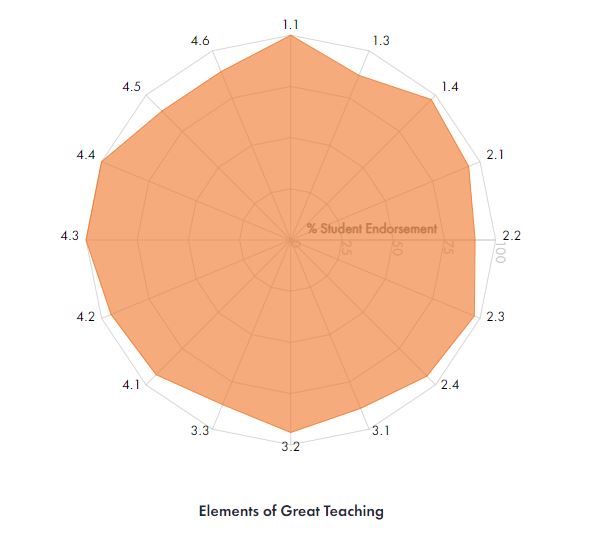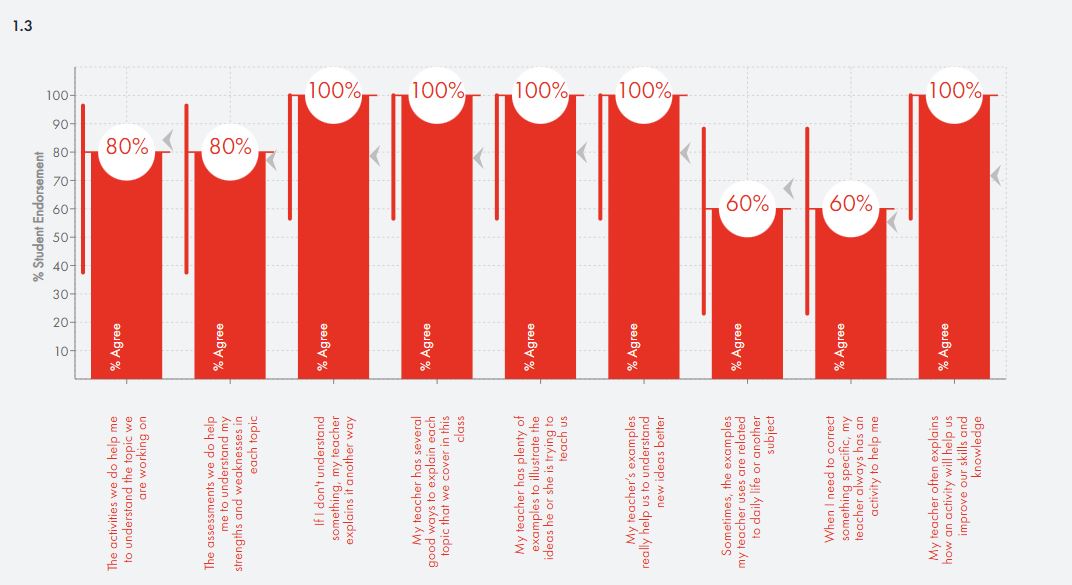By Stuart Kime
The Wellington Family of schools have been using the Great Teaching Toolkit across their schools for over 18 months. Adam Hicks, Head of Physics at Wellington College, gives us an insight into how student surveys have influenced his professional development. First published in The Bridge Newsletter April 2024.
Why do the Wellington Family of Schools trust the Great Teaching Toolkit?
The Great Teaching Toolkit is trusted for many reasons, but these three are to the fore:
1. It is based on the most robust and real evaluation of evidence, and pragmatic application to practice, that the sector has available – The Great Teaching Toolkit: Evidence Review.
a) Nuanced understanding of provenance, validity, significance and extent of transferability of the research
b) No cherry-picking or confirmation bias.
c) No extrapolation of weak correlations into strong causations.
2. It is based on ZERO judgement. Feeling judged leads to defensiveness, and a much decreased chance that someone can be authentic in seeking improvement.
3. It requires teachers to have agency and informed choice over what will be their focus.
In addition, Evidence Based Education has a very strong alignment with Wellington values:
Respect and Kindness – The Great Teaching Toolkit is founded on zero judgement, but instead on a belief that all teachers can get better, and, as mentioned above, one very good reason for this is to improve the chance of genuine engagement. In addition, respecting professional autonomy, individual perspectives and needs, is a foundation of belonging in a school community.
Courage – The Great Teaching Toolkit requires teachers to have the courage to ask for and relish feedback, and to welcome learning and growth.
Integrity – The Great Teaching Toolkit is based on the most balanced, realistic and authoritative review of the evidence about what works in teaching. Evidence Based Education published the GTT Evidence Review in 2020 to widespread positive reaction. The Great Teaching Toolkit therefore entirely avoids the pitfalls of cherry-picking research to suit a particular ideology or methodology.
Responsibility – Wellington enjoys a reputation for being one of the very best schools, a reputation shared by each Wellington family school in region. Wellington’s purpose of Pioneering education to serve and help shape a better world creates an imperative for all Wellington teachers to take responsibility to be the best that they can be, and a responsibility for Wellington to do something good for them.
Experiences of the GTT from around the Wellington Family
“Not only does the GTT focus on developing the kind of teaching that really makes a difference to student learning; it also applies the same methodology to the design and delivery of its own courses and development cycles.” Andrew MacCarthy, Wellington College International School Bangkok.
“The GTT has provided food for thought for our teachers and leaders and made us consider the way we approach teaching and learning. Working in an international bilingual context, with educators coming from all around the world, the GTT will hopefully help us bring coherence to our approaches in the classroom. It is non- prescriptive, teacher-led, research based and rooted in common sense while being easy to use for a busy teacher.” Lana Kulas, Huili School Shanghai.
Reflections from Adam Hicks, Head of Physics at Wellington College
In September 2023, I decided to survey my classes from the previous year using the Great Teaching Toolkit. The results are shown in Figure 1 & Figure 2 below. Instantly, a striking snapshot of my teaching emerged, pinpointing Element 1.3 (Relevant curriculum tasks) and 3.3 (Managing disruptive behaviour) as focal points.

Figure 1: Full Great Teaching Toolkit profile

Figure 2: Responses to Element 1.3
The Great Teaching Toolkit starts with essentially two propositions. Firstly, it challenges the notion that we, as educators, are fully aware of our strengths and weaknesses. Secondly, it acknowledges the diverse needs among teachers in every staff room, highlighting the need for targeted development. The tool operates through ‘developmental cycles,’ each lasting approximately a term. It forces you to spotlight areas for improvement at the cycle’s inception, utilising surveys, or observation. The survey tool itself is brilliant, being very objective, sidestepping character judgement and drilling down into each Dimension and Element (from the Model for Great Teaching) in detail.
Upon identifying a developmental area, it is time to start on the associated course. The stack of half-finished educational books in my room is quite staggering, as I start with the best intentions before gradually fizzing out. However, with the Great Teaching Toolkit succinctly presenting insights from meta studies and practically exploring their classroom applications, my motivation has remained.
Once the learning is done it is time to formulate a plan before implementing change in the classroom. This naturally leads to another round of surveys, not only to gauge development, but also to spotlight the next area of focus. Just as we never expect a student to master a skill after a single exposure, the same holds true for teacher training, a pitfall we often succumb to with one-off inset sessions or day courses. For me, the biggest benefit of the Great Teaching Toolkit lies in its protracted nature, leading to enduring, positive change.
Book a demo today to see how you can also support your CPD across your school or college.
Next case study
Next case study
Your next steps in becoming a Great Teaching school

